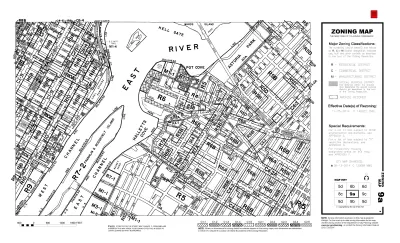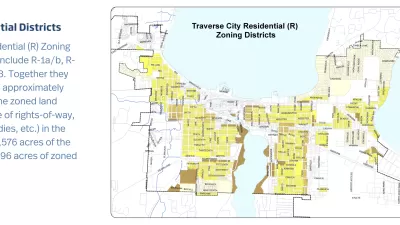The issue of zoning might be a place for wonks of both the conservatives and the liberal variety to find middle ground, but zoning in the real world is more contentious than consensus.

Daniel Hertz responds some of the points made in recent, high-profile arguments in favor of zoning reform to spur development in urban areas. Specifically, Ilya Somin recently claimed that there's a "cross-ideological consensus" about the need for zoning reform. New York Times columnist Paul Krugman and the White House showed evidence of a willingness among liberals to relax zoning regulations to spur development.
Hertz, however, argues that such a rosy picture about a consensus that reform looks like regulation neglects all the people fighting zoning reform at the local level.: "anyone who thinks there is a 'consensus' about the damage caused by too-strict zoning ought to attend the next community development meeting in their neighborhood." Far from the pro-development, anti-regulation consensus arguably found among wonks, the consensus at the local level might be quite the opposite, according to Hertz: "Arguably, something very close to a consensus has existed on zoning for quite some time—at least since the 1970s—and it’s not that it’s too strict. It’s that it’s doing a great job, and if anything needs to be stricter."
The article goes on to present some ideas for how to reform zoning in ways that work with these political (and financial, in the case of homeowners) realities in mind.
FULL STORY: About that “consensus” on zoning

Planetizen Federal Action Tracker
A weekly monitor of how Trump’s orders and actions are impacting planners and planning in America.

Chicago’s Ghost Rails
Just beneath the surface of the modern city lie the remnants of its expansive early 20th-century streetcar system.

San Antonio and Austin are Fusing Into one Massive Megaregion
The region spanning the two central Texas cities is growing fast, posing challenges for local infrastructure and water supplies.

Since Zion's Shuttles Went Electric “The Smog is Gone”
Visitors to Zion National Park can enjoy the canyon via the nation’s first fully electric park shuttle system.

Trump Distributing DOT Safety Funds at 1/10 Rate of Biden
Funds for Safe Streets and other transportation safety and equity programs are being held up by administrative reviews and conflicts with the Trump administration’s priorities.

German Cities Subsidize Taxis for Women Amid Wave of Violence
Free or low-cost taxi rides can help women navigate cities more safely, but critics say the programs don't address the root causes of violence against women.
Urban Design for Planners 1: Software Tools
This six-course series explores essential urban design concepts using open source software and equips planners with the tools they need to participate fully in the urban design process.
Planning for Universal Design
Learn the tools for implementing Universal Design in planning regulations.
planning NEXT
Appalachian Highlands Housing Partners
Mpact (founded as Rail~Volution)
City of Camden Redevelopment Agency
City of Astoria
City of Portland
City of Laramie





























